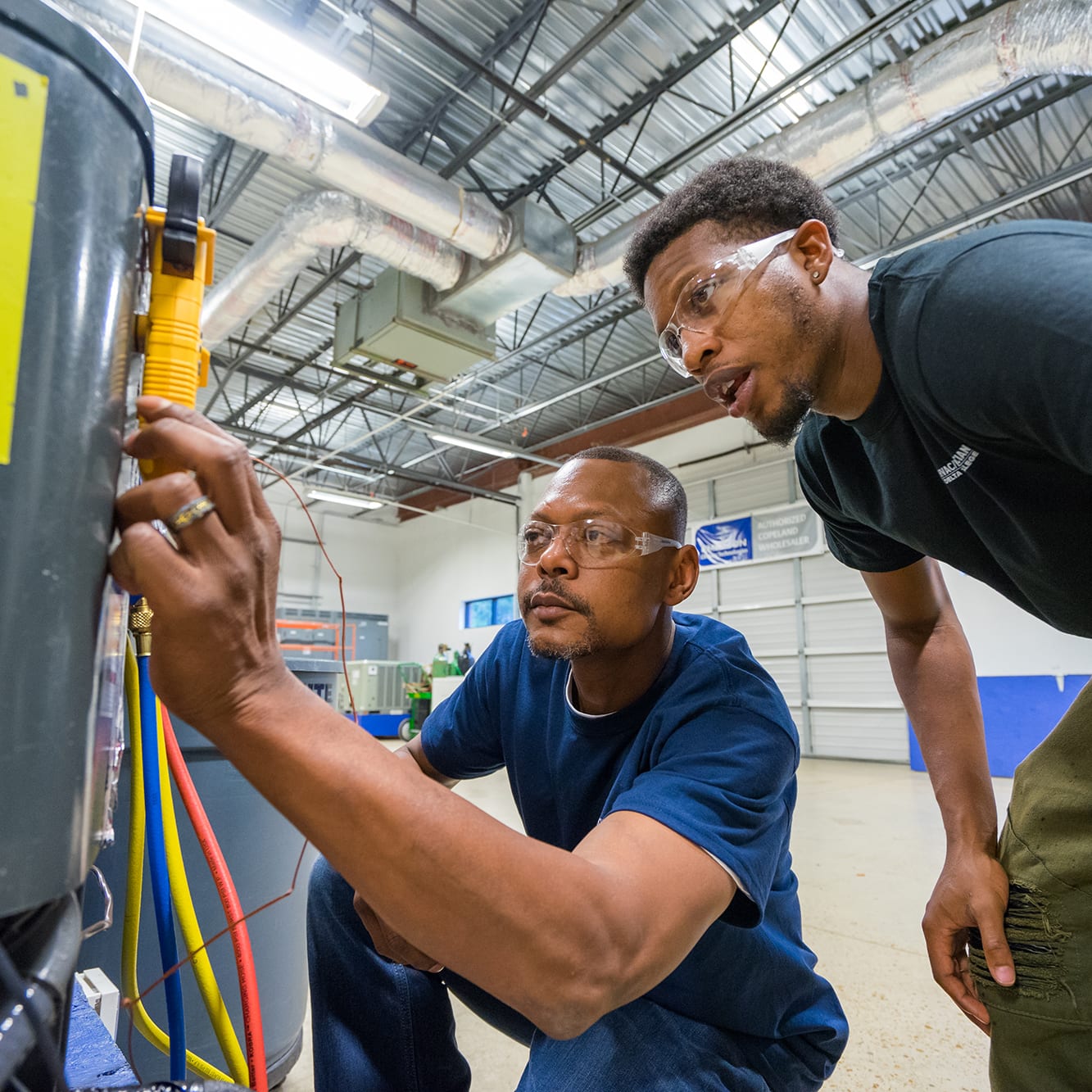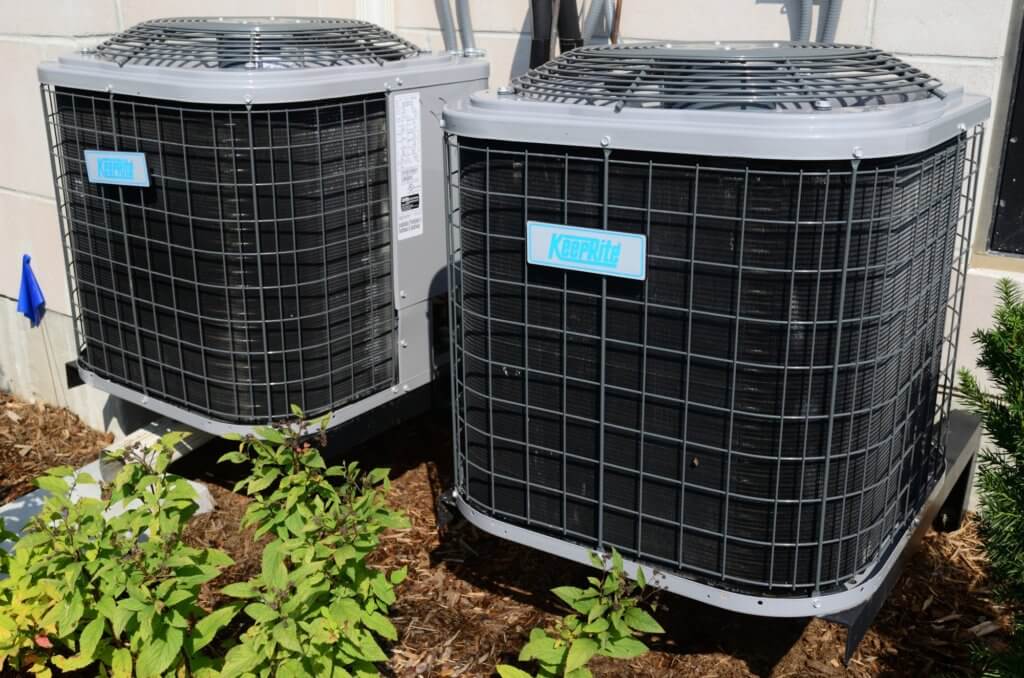Discovering the Important Parts of a Reliable Heating And Cooling System
A reliable cooling and heating system is built on several crucial elements that function in consistency. Each component, from the thermostat to the ductwork, plays a vital duty in keeping convenience and power effectiveness. Comprehending these aspects is crucial for maximizing performance and improving interior air top quality. As one analyzes these parts, the intricate connections in between them expose insights into enhancing total system performance. What specific factors contribute most to this effectiveness?
The Duty of the Thermostat in Heating And Cooling Effectiveness

Although typically forgotten, the thermostat plays a crucial function in the effectiveness of cooling and heating systems. HVAC experts. This tiny tool functions as the main control center, regulating temperature level setups and making sure suitable convenience within a room. By precisely sensing the ambient temperature, the thermostat connects with the air, air flow, and heating conditioning units to preserve the wanted climate
An efficient thermostat reduces power intake by activating the HVAC system just when needed, therefore avoiding excessive heating or air conditioning. Modern wise and programmable thermostats enhance this efficiency additionally by enabling users to establish schedules and from another location adjust settings, adjusting to day-to-day routines.
The placement of the thermostat is essential; improper location can lead to imprecise temperature level readings, resulting in inefficient operation. On the whole, a well-functioning thermostat not just boosts comfort but likewise adds significantly to energy financial savings and the durability of the cooling and heating system.
Understanding the Significance of Air Filters
Air filters serve a necessary feature in a/c systems by guaranteeing that the air distributing within an area remains clean and healthy. These filters trap dirt, allergens, and various other pollutants, preventing them from being recirculated throughout the environment. By recording these bits, air filters add to enhanced indoor air top quality, which can greatly profit occupants' health and wellness, particularly those with allergies or respiratory system conditions.
Additionally, preserving clean air filters enhances the effectiveness of HVAC systems. Clogged up filters can restrict airflow, causing the system to work more challenging to keep desired temperatures, bring about boosted energy intake and higher energy expenses. On a regular basis changing or cleaning up filters is an essential upkeep action that can extend the lifespan of HVAC tools. Ultimately, recognizing the significance of air filters permits homeowners and structure managers to take proactive procedures to ensure a well-functioning, efficient cooling and heating system that advertises a secure and comfy indoor atmosphere.

The Capability of the Furnace and Warm Pump
Furnaces and heatpump are crucial components of a/c systems, accountable for supplying heat throughout chillier months. Furnaces operate by home heating air via burning or electrical resistance, then dispersing it throughout the home by means of air ducts. They typically supply fast heating and can be fueled by gas, electricity, or oil, relying on the system type.
Alternatively, heatpump move heat rather than create it. They remove warmth from the outside air or ground, also in reduced temperatures, and move it inside your home. HVAC experts. This double functionality enables warm pumps to likewise supply cooling in warmer months, making them versatile choices for year-round environment control
Both systems call for correct maintenance to guarantee performance and durability. While heating systems succeed in extreme cold, warm pumps can be helpful in modest environments. Comprehending their unique capabilities aids home owners in choosing the most appropriate alternative for their heating requires.
Discovering the Air Conditioning System
The cooling unit is an important part of heating and cooling systems, readily available in various kinds to match various needs. Understanding the efficiency scores of these systems is necessary for making informed choices concerning energy usage and expense. This area will certainly check out the varied types of ac unit and clear up how performance scores influence performance.
Sorts Of Air Conditioners
While different variables affect the choice of cooling systems, comprehending the various kinds available is critical for homeowners and structure supervisors alike. Central air conditioning conditioners are created to cool down whole homes or buildings, using a network of air ducts for air movement. Home window devices use a Get the facts more localized solution, perfect for single spaces or little spaces. Mobile a/c provide versatility, allowing individuals to move the device as needed. Ductless mini-split systems are another choice, integrating the performance of central systems with the comfort of zoning, as they require no ductwork. Geothermal systems harness the earth's temperature for energy-efficient air conditioning. Each kind includes distinct benefits, making educated options necessary for reliable environment control.

Efficiency Scores Described
Comprehending effectiveness ratings is necessary for choosing the best air conditioning device, as these metrics provide insight right into the system's efficiency and energy consumption. The most typical ranking for a/c unit is the Seasonal Power Effectiveness Ratio (SEER), which gauges the cooling result during a regular cooling season divided by the total electrical power input. A higher SEER shows much better performance. In addition, the Power Effectiveness Proportion (EER) is used for gauging performance under particular conditions. One more crucial metric is the Energy Celebrity accreditation, which signifies that a device fulfills rigorous energy effectiveness standards. By assessing these rankings, consumers can make enlightened options that not just enhance comfort yet likewise minimize energy expenses and ecological effect.
The Importance of Ductwork and Airflow
Effective ductwork style and airflow monitoring play essential functions in the overall effectiveness and performance of a/c systems. Proper ductwork assurances that conditioned air is dispersed evenly throughout a space, lessening temperature level variations and boosting convenience. Properly designed air ducts minimize resistance to air movement, reducing the work on HVAC equipment and ultimately decreasing power usage.
Air flow administration involves strategically positioning vents and signs up to improve the flow of air. This prevents usual problems such as hot or cold areas, which can occur when airflow is try here blocked or improperly balanced. Additionally, the appropriate air duct materials and insulation can better enhance effectiveness by reducing warmth loss or gain during air transit.
A reliable ductwork system not only adds to power cost savings but can additionally extend the lifespan of HVAC tools by decreasing unneeded stress (HVAC experts). Recognizing the value of ductwork and air flow is crucial for attaining peak Heating and cooling system performance.
Regular Maintenance Practices to Enhance Efficiency
Normal upkeep practices are necessary for ensuring peak efficiency of a/c systems. These methods include regular inspections, cleansing, and necessary repair services to keep the system running efficiently. Consistently changing air filters is essential, as stopped up filters can block airflow and decrease performance. Additionally, technicians should examine and clean evaporator and condenser coils to avoid getting too hot and energy wastefulness.
Annual expert assessments are also advised, as skilled technicians can identify possible issues before they intensify. Lubricating relocating components reduces wear and tear, adding to a much longer life expectancy for the system. Additionally, making sure that the thermostat functions properly aids in preserving ideal temperature level control.

Frequently Asked Questions
How Usually Should I Change My Thermostat?
Thermostats ought to normally be replaced every 5 to one decade, relying on usage and modern technology innovations. Regular checks are suggested to ensure peak performance, particularly if experiencing inconsistent temperature level control or raised energy costs.
What Size Air Filter Is Best for My Heating And Cooling System?
The very best dimension air filter for a HVAC system varies by unit style. Normally, it's important to seek advice from the owner's guidebook or check the existing filter dimensions to assure peak efficiency and air quality.
Can I Mount a Heatpump Myself?
Setting up a heat pump individually is possible for proficient individuals, however it requires expertise of neighborhood codes and electric systems. Employing an expert is advised to guarantee correct setup and perfect system efficiency.
How Do I Know if My Ductwork Is Efficient?
To establish ductwork effectiveness, one need to look for leaks, action air movement at vents, check insulation quality, and assess temperature distinctions between supply and return ducts. Specialist analyses can supply complete insights right into total performance.
What Are Signs My A/c Needs Immediate Upkeep?
Signs that a HVAC system needs instant upkeep consist of uncommon noises, inconsistent temperature levels, raised energy expenses, undesirable smells, and frequent biking. Resolving these issues immediately can prevent additional damages and assurance height system performance.
Air filters offer an essential feature in HVAC systems by ensuring that the air distributing within an area remains healthy and tidy. Furthermore, keeping clean air filters enhances the efficiency of HVAC systems. Ductless mini-split systems are another choice, combining the effectiveness of central systems with the convenience of zoning, as they need no ductwork. Understanding performance ratings is vital for choosing the right air conditioning unit, as these metrics supply understanding into the system's efficiency and energy usage. The see here now ideal size air filter for a HVAC system differs by device style.